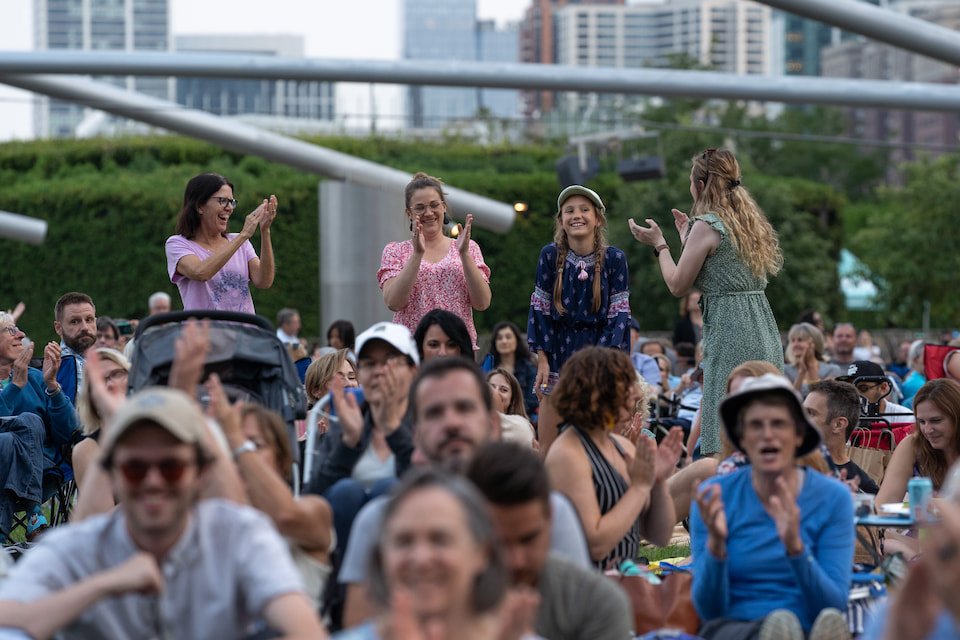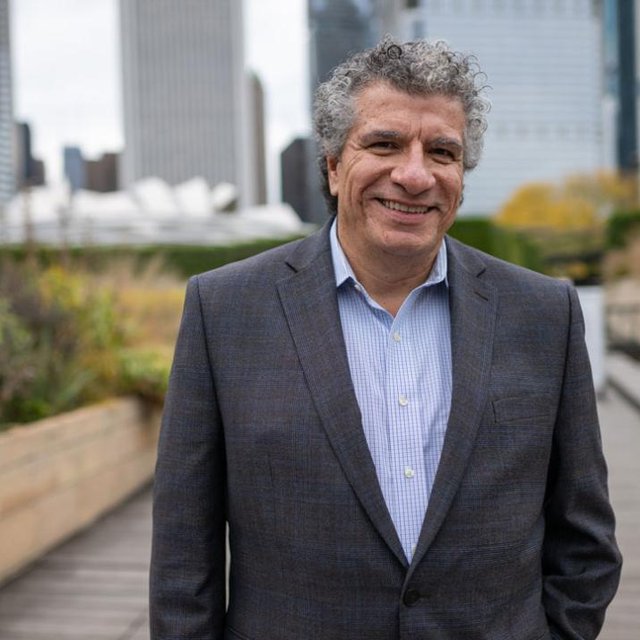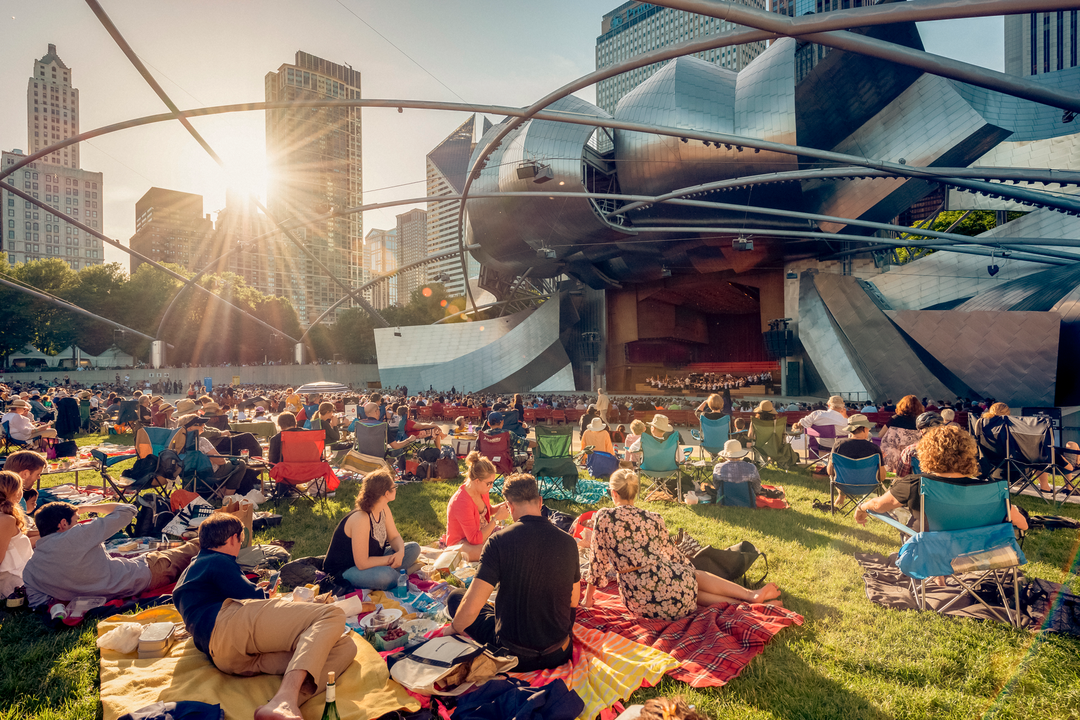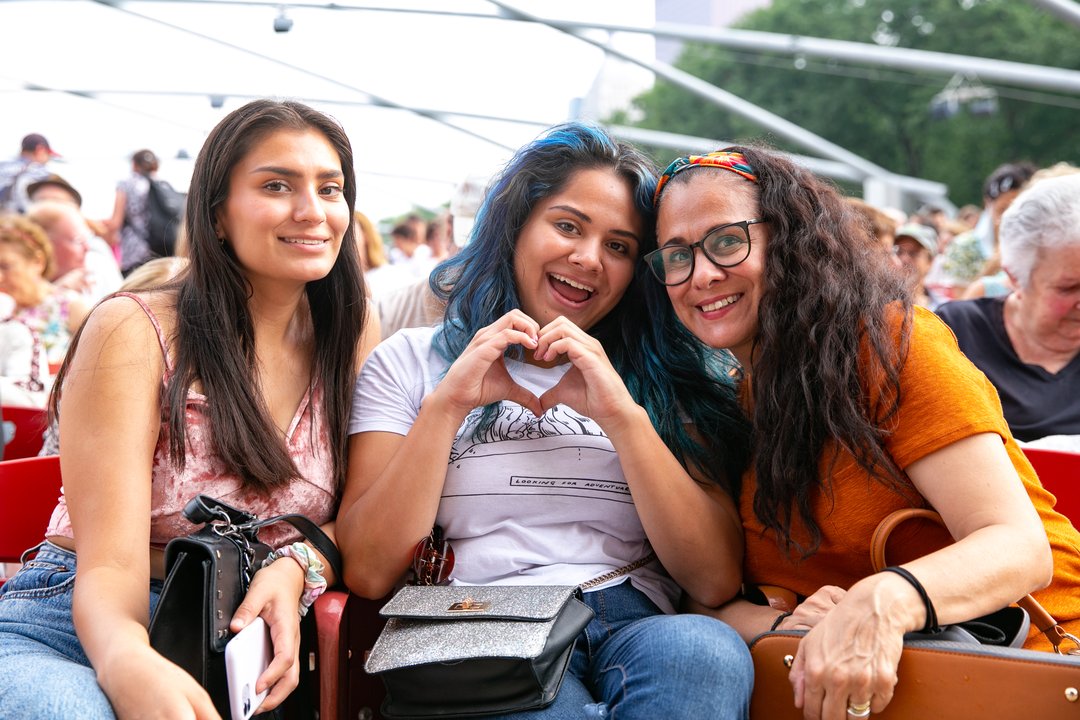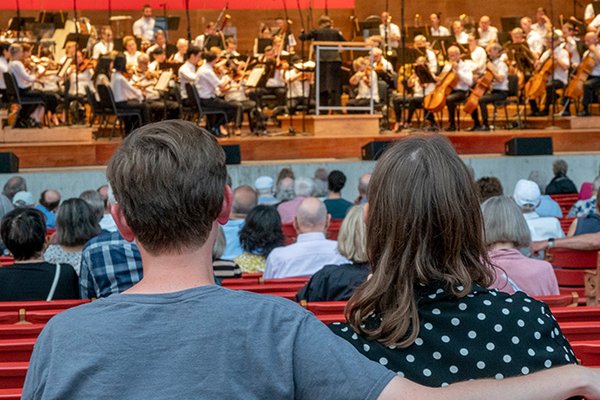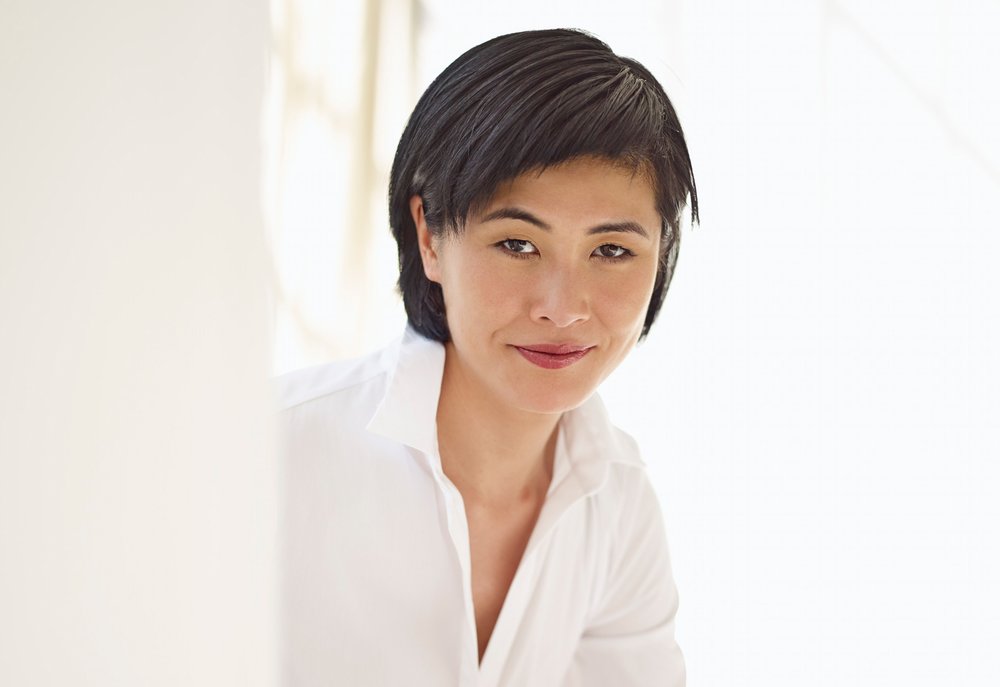
Stravinsky Firebird
Program
Benjamin Britten The Building of the House (5 mins)
Jennifer Higdon The Singing Rooms (37 mins)
Three Windows: Two Versions of the Day
Things Aren't Always
The Interpretation of Dreams
Confession
History Lesson
A Word with God
Three Windows: Two Versions of the Day
Intermission (20 mins)
Lera Auerbach Icarus (12 mins)
Igor Stravinsky Suite from The Firebird (1919 version) (23 mins)
Introduction
Dance of the Firebird – The Firebird’s Variation
Round Dance of the Princesses
Infernal Dance of King Kastchei
Berceuse
Finale
Featuring
-
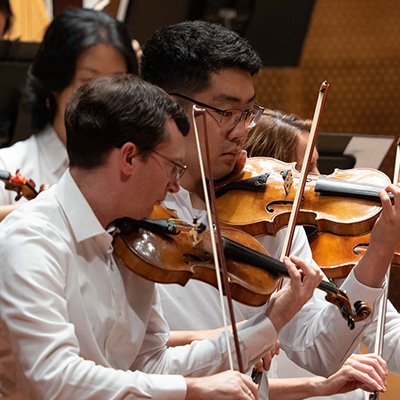
Grant Park Orchestra
Orchestra
-
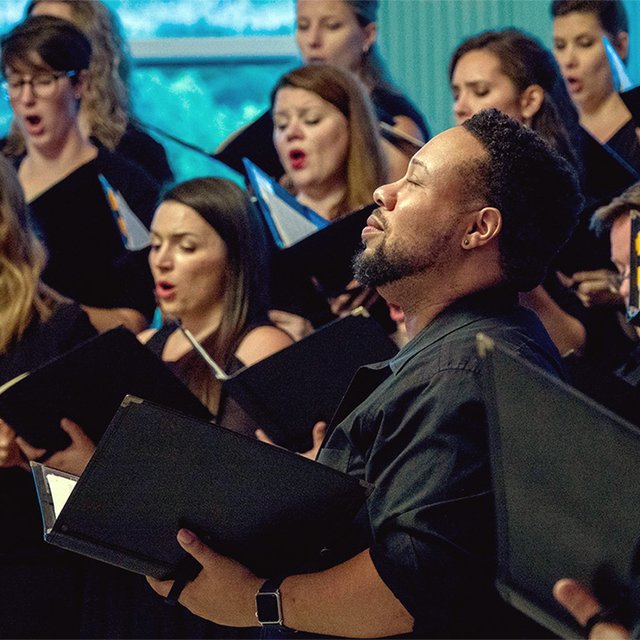
Grant Park Chorus
Chorus
-
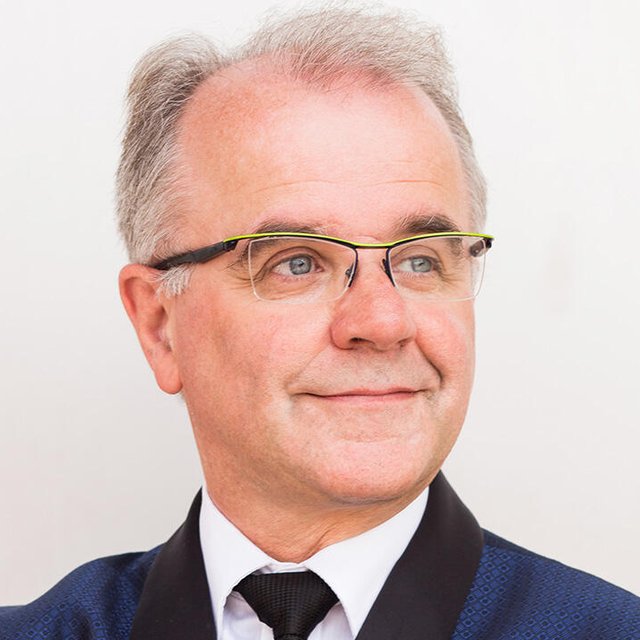
Christopher Bell
Chorus Director
-
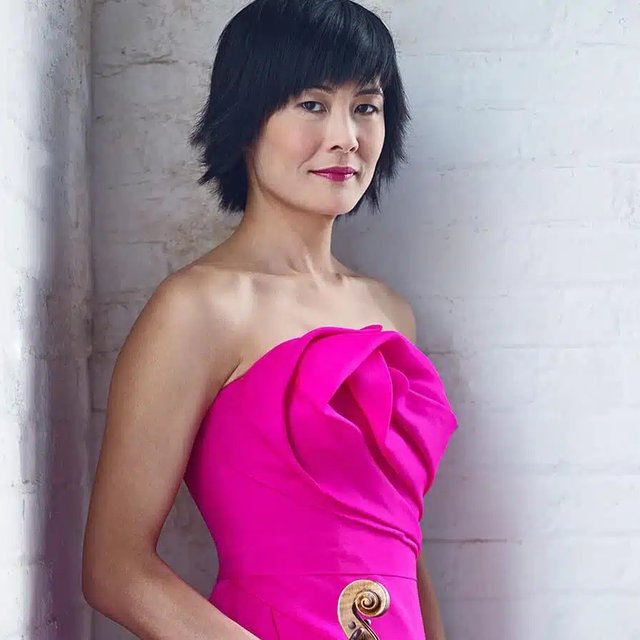
Jennifer Koh
Violin
Program Notes
Benjamin Britten (1913–1976)
The Building of the House, op. 79 (1967)
Scored for: two flutes, two oboes, two clarinets, two bassoons, two French horns, two trumpets, tuba, timpani, percussion, strings, and chorus
Performance time: 5 minutes
First Grant Park Orchestra performance
Benjamin Britten composed the choral overture The Building of the House in 1967 for the inauguration of the Snape Maltings concert hall. The hall is one of the main sites of the annual Aldeburgh Festival, which Britten and his partner, tenor Peter Pears, founded in 1948 alongside the music education organization Britten Pears Arts. Although the overture can be performed without chorus, with the chorus part played by organ and trombones, the choral version sets a version of Psalm 127 adapted by Imogen Holst, the daughter of composer Gustav Holst and a fine composer in her own right. Amid a flurry of orchestral activity, suggesting busy workers constructing the concert hall, the chorus sings the words of Psalm 127 to the stately Lutheran chorale tune “Vater unser im Himmelreich” (“Our Father in Heaven”).
Jennifer Higdon (b. 1962)
The Singing Rooms (2006)
Scored for: two flutes, two oboes including English Horn, two clarinets, two bassoons, four French horns, three trumpets, three trombones, tuba, timpani, percussion, harp, strings, chorus, and solo violin
Performance time: 38 minutes
First Grant Park Orchestra performance
Despite a relatively late start to formal musical training at 18 years old, Jennifer Higdon has gone on to become one of the most-performed American composers working today, winning three Grammy Awards and the Pulitzer Prize in 2010 for her Violin Concerto. Three years prior, Higdon had written another violin concerto, The Singing Rooms. Scored for solo violin, orchestra, and chorus, The Singing Rooms is a kind of concerto–oratorio hybrid. Tonight’s soloist, violinist Jennifer Koh, premiered the work with the Philadelphia Orchestra under Christoph Eschenbach in 2008.
Higdon struggled to find the right set of poems that would not only speak to her but also invite musical setting and fit together thematically. “I discovered that sometimes the answer is in your own backyard,” Higdon writes in her program note. She approached a fellow faculty member at the Curtis Institute of Music, Jeanne Minahan, the head of the conservatory’s liberal arts department and a poet. Upon reading Minahan’s work, Higdon knew she had found what she was looking for: a series of poems that would allow for different emotional settings “as if they were lessons in life arranged like different rooms within a house.” It is not just the chorus who sings in The Singing Rooms. “This is a house where the violin sings, the choir sings, and the orchestra sings,” Higdon explains. “Every room is its own sound world. Not an ordinary house, this is the house that we all inhabit: that of life.”
The first movement, “Three Windows: Two Versions of the Day,” captures the changing nature of light depending on the time of day, from the cool light of morning to the blazing sun of the late afternoon. After the solo violin’s pensive rhapsodizing, the chorus offers a somber homophonic incantation accompanied by tolling bells. In “Things Aren’t Always,” the orchestra is more active and texturally varied, constantly moving and shifting. Gentle rocking and lush harmonies evoke the poet’s dream on the boat in “The Interpretation of Dreams.” The fourth movement, “Confession,” begins anxiously as the poet builds up the courage to divulge her dreams to another, the mood softening when she reveals she dreamt she slept inside a flower. At just over three minutes long, “History Lesson” was meant to capture how quickly we tend to forget the lessons of history. The ominous percussion and menacing repetitions of the word “How” that open the movement portend the danger of such forgetfulness.
The most expansive movement of the concerto, “A Word with God” opens with an intimate conversation between the English horn and solo violin, the conversation becoming more urgent and complex as more instruments and voices are added. The poem opens with an Irish proverb: “Your feet will bring you to where your heart is.” Higdon repeats this proverb at the end of the movement to bring the listener back to the room where the concerto began. Coming full circle, the second setting of “Three Windows: Two Versions of the Day” presents what Higdon calls “a view at the close of a day in life . . . a return to the original room, but with wisdom gained and all seen in a new light.”
Lera Auerbach (b. 1973)
Ikarus (Icarus) (2006)
Scored for: three flutes including piccolo, three oboes including English Horn, three clarinets including bass clarinet, three bassoons including contrabassoon, four French horns, three trumpets, three trombones, tuba, timpani, percussion, two harps, piano, celesta, theremin, and strings
Performance time: 12 minutes
First Grant Park Orchestra performance
A true Renaissance woman, Lera Auerbach has achieved acclaim as a conductor, pianist, composer, poet, and visual artist. Growing up in Chelyabinsk, a city on the border of Siberia, Auerbach immersed herself in the world of ancient Greece—specifically, Greek mythology. “The world outside made much more sense through the perspective of the ancient Greek myths, where it was quite common for a power-protective god to devour all his children,” she writes. The figure of Icarus captured her imagination in particular. In the story, Icarus dons wings of beeswax crafted by his father, Daedalus. Like a typical teenager, Icarus does not heed his father’s warnings. Instead, he soars higher and higher, exhilarated by the feeling of freedom, until, having flown too close to the sun, his wings melt, causing him to plummet into the ocean. “What makes this myth so touching is Icarus’s impatience of the heart, his wish to reach the unreachable, the intensity of the ecstatic brevity of his flight and inevitability of his fall,” Auerbach explains.
In 2011, Auerbach extracted the last two movements from her Symphony No. 1, “Chimera,” (2006) to create the symphonic poem Icarus. While a chimera is a Greek mythological creature, the myth of Icarus was not in her mind when she initially composed the work. However, she was reminded of the myth after hearing the extracted movements in their new context. “All my music is abstract, but by giving evocative titles I invite the listener to feel free to imagine, to access his own memories, associations,” she writes in her program note for Icarus. Further, the title beckons the listener to reflect on the innate human desire to transcend the limits imposed on us.
Igor Stravinsky (1882–1971)
Suite from The Firebird (Zhar’-ptitsa; L'oiseau de feu) (1909, Reorchestrated by the composer in 1919)
Scored for: two flutes including piccolo, two oboes including English Horn, two clarinets, two bassoons, four French horns, two trumpets, three trombones, tuba, timpani, percussion, harp, piano, celesta, and strings
Performance time: 23 minutes
First Grant Park Orchestra performance: August 2, 1935; Eric DeLamarter, conductor
Art critic and impresario Sergei Diaghilev was passionate about exporting Russian art and music abroad, particularly in the cultural hub of Paris. In 1906, Diaghilev organized an exhibition of Russian art. The exhibition’s success spurred him to mount a series of concerts of Russian music the following year and a production of Mussorgsky’s opera Boris Godunov in 1908. By building up the Parisian public’s appetite for Russian culture, Diaghilev had laid the groundwork to form the Ballets Russes in 1909. The company’s first season was received favorably, though the press complained about the lack of musical novelty. So, for the 1910 season Diaghilev decided to commission a new ballet based on Russian fairy tales. The only question was—who would compose the score?
The previous season, Diaghilev had commissioned Igor Stravinsky—then only 27 and virtually unknown—to reorchestrate two Chopin piano pieces for a production of Les Sylphides. Diaghilev was sufficiently pleased with the young composer’s work, eventually offering him the commission for the new ballet. His gamble paid off. The success of The Firebird not only continued to stoke the Parisian craze for all things Russian, but it also catapulted Stravinsky’s career overnight and led to the commissions for Petrushka (1911) and The Rite of Spring (1913).
Theatrical designer Alexandre Benois and choreographer Mikhail Fokine combined multiple archetypal characters and stories from Russian folklore for the scenario of The Firebird. In the ballet, Prince Ivan captures the Firebird in the enchanted garden of the evil sorcerer Kashchei. Prince Ivan lets the Firebird go but keeps a feather as a talisman. In the garden he also encounters 13 princesses dancing a slow khorovod, a traditional circle dance. Kashchei has imprisoned them and will turn anyone attempting to rescue them to stone. Determined to save the princesses and wed the youngest, Prince Ivan summons the Firebird with the feather. She casts a spell over Kashchei and his minions, causing them to dance themselves to exhaustion and then lulling them to sleep. The Firebird then instructs Prince Ivan to destroy a giant egg in which Kashchei has hidden his soul. Upon breaking the egg, Kashchei dies, releasing the kingdom from his tyranny.
“Music more poetic, music more expressive of every moment and shading, music more beautiful-sounding and phantasmagoric could not be imagined,” Benois said of Stravinsky’s score. Stravinsky remained fond of The Firebird and created three concert versions. The suite compiled in 1919 is the most popular and will be performed tonight. From his teacher, Nikolai Rimsky-Korsakov, Stravinsky not only learned masterful orchestration techniques but also adopted his idea of using chromaticism to depict mystical themes and simple folk songs to represent the mortal world. A spooky winding figure in the low strings sets the scene in Kashchei’s evil domain. Glassy string glissandos and tremolos mirror the bird’s shimmering plumage, while busy woodwinds show her struggle to escape. Representing the human world, “The Princesses’ Khorovod” quotes a Russian folk song Rimsky-Korsakov used in his Sinfonietta on Russian Themes. The frenetic rhythms of “Infernal Dance of King Kashchei” whip the sorcerer and his court into a frenzy before a languid bassoon melody casts a sleepy pall over “Lullaby.” In the finale, a solo horn announces a new dawn, the majestic theme building as goodness and light return.
—Katherine Buzard
Event Sponsors
This concert is generously supported by Lori Julian for The Julian Family Foundation and graciously underwritten as part of the Dehmlow Choral Music Series.
Artistic Leadership
-

Christopher Bell
Chorus Director
Support The Festival
Violin I
Jeremy Black, concertmaster
Vacant, assistant concertmaster
Trista Wong
Zulfiya Bashirova
Jennifer Cappelli
Injoo Choi
Dima Dimitrova
Erica Hudson
Hyewon Kim
Matthew Lehmann
Jayna Park
Rika Seko
Karen Sinclair
Bonnie Terry
Krzysztof Zimowski
Violin II
Liba Shacht, principal
Vacant, assistant principal
Ying Chai
Ran Cheng
Karl Davies
Likai He
Ann Lehmann
Laura Miller
Cristina Muresan
Kjersti Nostbakken
Irene Radetzky
Jeanine Wynton
Thomas Yang
Viola
Terri Van Valkinburgh, principal
Yoshihiko Nakano, assistant principal
Elizabeth Breslin
Beatrice Chen
Amy Hess
Rebecca Swan
Chloé Thominet
Cello
Walter Haman, principal
Peter Szczepanek, assistant principal
Calum Cook
Larry Glazier
Steven Houser
Eric Kutz
Eran Meir
Double Bass
Colin Corner, principal
Peter Hatch, assistant principal
Andrew Anderson
Christian Luevano
Samuel Rocklin
Chunyang Wang
Chris White
Flute
Vacant, principal
Alyce Johnson
Jennifer Lawson, assistant principal
Piccolo
Jennifer Lawson
Oboe
Mitchell Kuhn, principal
Vacant
Anne Bach, assistant principal
English Horn
Anne Bach
Clarinet
Dario Brignoli, principal
Trevor O’Riordan, assistant principal
Besnik Abrashi
Bass Clarinet
Besnik Abrashi
Bassoon
Eric Hall, principal
Nicole Haywood Vera Tenorio, assistant principal
Vacant
Contrabassoon
Vacant
Horn
Vacant, principal
Stephanie Blaha, assistant principal
Neil Kimel
Brett Hodge
Paul Clifton
Trumpet
David Gordon, principal
Mike Brozick
Vacant, assistant principal
Vacant
Trombone
Daniel Cloutier, principal
Jeremy Moeller, assistant principal
Bass Trombone
Alexander Mullins
Tuba
Andrew Smith, principal
Timpani
Daniel Karas, principal
Josh Jones, assistant principal
Percussion
Josh Jones, principal
Vacant, assistant principal
Doug Waddell
Harp
Kayo Ishimaru-Fleisher, principal
Keyboards
Christopher Guzman
Orchestra Librarian
Eliza Bangert, principal
Grant Park Chorus
* denotes leave-of-absence † 2025 Vocal Fellow
Laura Lynch Anderson
Kristina Bachrach
Madalynn Baez
Megan E. Bell
Alyssa Bennett
Tamara Bodnar
Kylie Buckham
Anna Joy Buegel
Laura Bumgardner
Katherine Buzard
Bethany Clearfield
Nathalie Colas
Carolyne DalMonte
Megan Fletcher
Kaitlin Foley
Saira Frank
Julia Frodyma
Katherine Gray-Noon
Kimberly Gunderson
Alexandra Ioan
Alexandra Kassouf
Darlene Kelsey
Olivia Knutsen
Marybeth Kurnat
Katelyn Lee
Kyuyim Lee+
Rosalind Lee
Veronica Mak
Hannah Dixon McConnell
Marie McManama
Kathleen Monson
Susan Nelson
Evangeline Ng
Máire O'Brien
Alexandra Olsavsky
Laura Perkett
Angela Presutti Korbitz
Alexia Rivera
Veronica Samiec
Emily Sinclair
Molly Snodgrass
Tiana Sorenson
Christine Steyer
Sarah van der Ploeg*
Lydia Walsh-Rock
Sherry Watkins
Emily Amesquita
Melissa Arning
Christina Bernardoni
Angela Born
Bethany Brewer
Julie DeBoer
Leah Dexter
Katrina Dubbs
Stacy Eckert
Margaret Fox
Catarine Hancock
Ruth Ginelle Heald
Sophia Heinz
Miya Higashiyama
Carla Janzen
Amy Allyssa Johnson
Kathryn Kinjo Duncan
Amanda Koopman
Anna Laurenzo
Jeannette Lee
Thereza Lituma
Chelsea Lyons
Victoria Marshall
Jessica McCarthy
Quinn Middleman
Ella Peters
Sarah Ponder
Emily Price
Stephanie Schoenhofer
Suzanne A. Shields
Marissa Simmons
Cassidy Smith
Aidan Spencer
Alannah Spencer
Margaret Stoltz
Carolyn Sundlof Boudreau
Gabrielle Timofeeva López
Elizabeth Vaughan
Corinne Wallace-Crane
A.J. Wester
Debra Wilder
Isabel Yang+
Charles Anderson
Enrico Giuseppe Bellomo
Justin Berkowitz
Madison Bolt
Hoss Brock
Steven Caldicott Wilson
Opal Clyburn-Miller+
John J. Concepción
Micah Dingler
Jared V. Esguerra
Alec Fore
Ace Gangoso
Klaus Georg
Tejas Gururaja
Paul Hunter
Garrett Johannsen
William Johnson
James Judd
Tim Lambert
Tyler Lee
Stephen D. Noon
Marcos Ochoa
Brett Potts
Nicholas Pulikowski
Peder Reiff
Samuel Rosner
Matthew W. Schlesinger
Joe Shadday
Aaron Short
Brian Skoog
Michael St. Peter
Ryan Townsend Strand
Alan Taylor*
Sean J. Watland
Nate Widelitz
Walter Aldrich
Evan Bravos
Matthew Brennan
Michael Cavalieri
Ryan J. Cox
Ed Frazier Davis
Lifan Deng
Matthew Dexter+
Chris DiMarco
Christopher Filipowicz
Dimitri German
Dominic German
David Govertsen
Spencer Greene
Brian Hupp
Jan Jarvis
Jess Koehn
Eric Miranda
Ian Morris
Ian Murrell
John E. Orduña
Wilbur Pauley
Douglas Peters
Jackson Pierzina
Martin Lowen Poock
Ian Prichard
Dan Richardson
Stephen Richardson
Benjamin D. Rivera
Scott Uddenberg
Schyler Vargas
Vince Wallace
Aaron Wardell
Ronald Watkins
Jonathon Weller
Peter Wesoloski
Jonathan Wilson
Chuck Foster
John Goodwin
Kyuyim Lee
Isabel Yang
Opal Clyburn-Miller
Matthew Dexter
